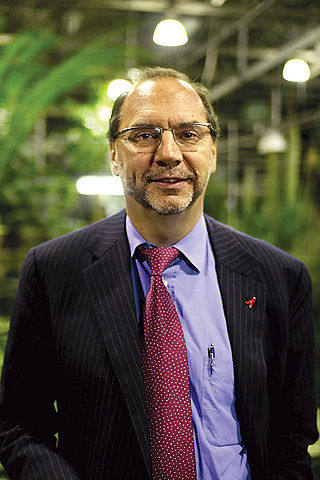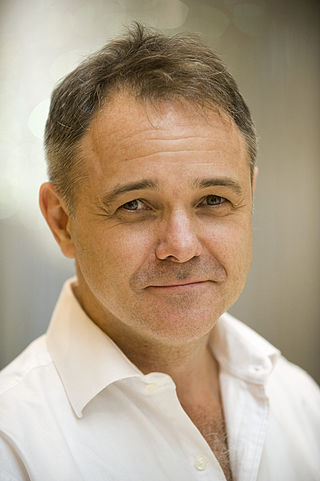
Arizona State University is a public research university in the Phoenix metropolitan area, Arizona, United States. Founded in 1885 as Territorial Normal School by the 13th Arizona Territorial Legislature, the university is one of the largest public universities by enrollment in the United States. It was one of about 180 "normal schools" founded in the late 19th century to train teachers for the rapidly growing public common schools. Some closed, but most steadily expanded their role and became state colleges in the early 20th century, then state universities in the late 20th century.

Sir Peter Karel, Baron Piot is a Belgian-British microbiologist known for his research into Ebola and AIDS.
The Texas A&M Institute of Biosciences and Technology (IBT), a component of Texas A&M Health, and The Texas A&M University System, is located in the world's largest medical center, the Texas Medical Center, in Houston, Texas. The institute provides a bridge between Texas A&M University System scientists and other institutions' researchers working in the Texas Medical Center and the biomedical and biotechnology research community in Houston. It emphasizes collaboration between member scientists and others working in all the fields of the biosciences and biotechnology. IBT encourages its scientists to transfer discoveries made in their laboratories to the clinic and marketplace.

The Biodesign Institute is a major research center known for nature-inspired solutions to global health, sustainability, and security challenges located on the Tempe campus of Arizona State University. The institute is organized into a growing number of collaborative research centers and laboratories staffed by scientists in diverse disciplines. It is currently led by Executive Director Dr. Joshua LaBaer, a personalized diagnostics researcher.
George Henry Poste, CBE FRS, is a former director of the Biodesign Institute at Arizona State University.

The Vaccine Research Center (VRC), is an intramural division of the National Institute of Allergy and Infectious Diseases (NIAID), part of the National Institutes of Health (NIH), US Department of Health and Human Services (HHS). The mission of the VRC is to discover and develop both vaccines and antibody-based products that target infectious diseases.
Sir Gordon William Duff, is a British medical scientist and academic. He was principal of St Hilda's College, Oxford, from 2014 to 2021. He was Lord Florey Professor of Molecular Medicine at the University of Sheffield from 1991 to 2014.

Sir Jeremy James Farrar is a British medical researcher who has served as Chief Scientist at the World Health Organization since 2023. He was previously the director of The Wellcome Trust from 2013 to 2023 and a professor of tropical medicine at the University of Oxford.
Translational Health Science and Technology Institute (THSTI) is an institute of the Biotechnology Research and Innovation Council (BRIC), Department of Biotechnology, Ministry of Science and Technology, Government of India. It was set up in 2009 and is located in NCR Biotech Science Cluster, Faridabad. Envisioned by former secretary of DBT, Dr. M. K. Bhan, the institute was created to enable a faster transition of lab research to market. Prof. Ganesan Karthikeyan is the Executive Director of THSTI.
Balram Bhargava is an Indian physician scientist, cardiologist, medical educationist, and innovator. He is currently serving as the Chief of Cardiothoracic Centre, AIIMS. He is the former Director General at the Indian Council of Medical Research, New Delhi and secretary of the Department of Health Research; a division under Ministry of Health and Family Welfare, Government of India.
Virander Singh Chauhan is an Indian scientist and a Rhodes Scholar working in the fields of genetic engineering and biotechnology. He is known for his contributions to the development of a recombinant vaccine for malaria. and for synthetic structural peptides with biological functions. He was honored by the Government of India in 2012 with the fourth highest Indian civilian award of Padma Shri. He is the present Chancellor of the Gandhi Institute of Technology and Management.

Bruce E. Rittmann is Regents' Professor of Environmental Engineering and Director of the Swette Center for Environmental Biotechnology at the Biodesign Institute of Arizona State University. He was also elected a member of the National Academy of Engineering in 2004 for pioneering the development of biofilm fundamentals and contributing to their widespread use in the cleanup of contaminated waters, soils, and ecosystems.

Santanu Bhattacharya is an Indian chemical biologist and former professor at the Indian Institute of Science. At, present he is the Director of the Indian Institute of Science Education and Research, Tirupati (IISER-Tirupati). He is known for his studies of unnatural amino acids, oligopeptides, designed and natural lipids, gene delivery vehicles, hydro- and organogels, molecular bioanalytic sensors, G-quadruplex DNA binding molecular therapeutics, and biologically active natural product mimics and is an elected fellow of the Indian National Science Academy The World Academy of Sciences and the Indian Academy of Sciences The Council of Scientific and Industrial Research, the apex agency of the Government of India for scientific research, awarded him the Shanti Swarup Bhatnagar Prize for Science and Technology, one of the highest Indian science awards, in 2003, for his contributions to chemical sciences. He is also a recipient of the National Bioscience Award for Career Development of the Department of Biotechnology (2002) and the TWAS Prize (2010).
Gary J. Nabel is an American virologist and immunologist who is President and chief executive officer of ModeX Therapeutics in Natick, Massachusetts. He was the founding director of Vaccine Research Center at the National Institute of Allergy and Infectious Diseases.
Sudhanshu Vrati is an Indian immunologist, microbiologist and the director of the Regional Centre for Biotechnology. Known for his studies in the fields of RNA virus replication and vaccine development, Vrati is an elected fellow of the National Academy of Sciences, India, Indian National Science Academy and the Indian Academy of Sciences. The Department of Biotechnology of the Government of India awarded him the National Bioscience Award for Career Development, one of the highest Indian science awards, for his contributions to biosciences in 2003.
Tilak Raj Sharma is an Indian plant biologist, the Deputy Director General (CS) of ICAR and former executive director and chief executive officer of the National Agri-Food Biotechnology Institute (NABI), and Center of Innovative and Applied Bioprocessing (CIAB) respectively, both autonomous institutes under the Department of Biotechnology. Known for his studies in the fields of genomics and plant disease resistance, Sharma is an elected fellow of the National Academy of Sciences, India, the National Academy of Agricultural Sciences and the Indian National Science Academy. The Department of Biotechnology of the Government of India awarded him the National Bioscience Award for Career Development, one of the highest Indian science awards, for his contributions to biosciences in 2007.
Rachel Kerina Chikwamba is a Zimbabwean plant geneticist born in 1967. She is in the Council for Scientific and Industrial Research (CSIR) Group Executive: Strategic Alliances and Communication. She is an active member of the Academy of Science of South Africa.

John R. Mascola is an American physician-scientist, immunologist and infectious disease specialist. He was the director of the Vaccine Research Center (VRC), part of the National Institute of Allergy and Infectious Diseases (NIAID), National Institutes of Health (NIH). He also served as a principal advisor to Anthony Fauci, director of NIAID, on vaccines and biomedical research affairs. Mascola is the current Chief Scientific Officer for ModeX Therapeutics.
Hao Yan is a Chinese-American chemist, a (bio)molecular designer, programmer and engineer.
The Wyss Institute for Biologically Inspired Engineering is a cross-disciplinary research institute at Harvard University focused on bridging the gap between academia and industry by drawing inspiration from nature's design principles to solve challenges in health care and the environment. It is focused on the field of biologically inspired engineering to be distinct from bioengineering and biomedical engineering. The institute also has a focus on applications, intellectual property generation, and commercialization.







